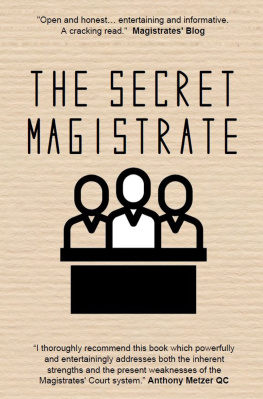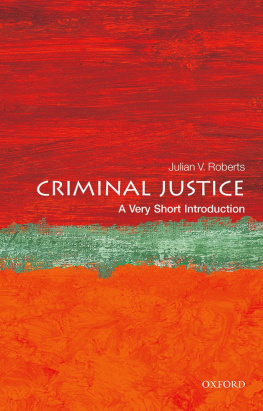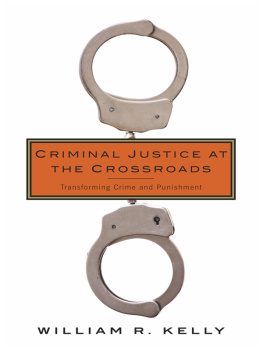Transforming Summary Justice
Sweeping changes are being introduced into the lower-tier magistrates courts in England and Wales in efforts to modernise the system and speed up case processing. They concentrate on delivering prompt justice within a modern, efficient and technologically advanced system. But these transformations are fundamentally changing the way justice is delivered. This book analyses criminal court streamlining processes and argues that there are areas where due process protections are being undermined.
Transforming Summary Justice reports empirical research carried out with lay magistrates and criminal justice professionals. Views and experiences drawn from magistrates are valuable because of the central role they perform in lower court justice. Further, magistrates provide a wider understanding of the context in which the lower criminal courts operate and enable a critical appraisal of this unique style of lay justice.
This book is directed at students of criminology, criminal justice and socio-legal studies, who will find the debates stimulating and useful to engage with in contemporary analyses of criminal court justice. It will also be of interest to justice and legal professionals who are seeing swingeing alterations to the field in which they work. The book will have appeal in other common-law jurisdictions, where similar modifications to lower court justice are occurring, and also across Europe, where lay involvement in legal decision-making is being debated and becoming accepted practice.
Jennifer Ward is a senior lecturer in criminology at the School of Law at Middlesex University, London.
Routledge Frontiers of Criminal Justice
| 30 | Accountability of Policing
Edited by Stuart Lister and Michael Rowe |
| 31 | International Developments and Practices in Investigative Interviewing and Interrogation
Volume 1: Victims and witnesses
Edited by David Walsh, Gavin Oxburgh, Allison Redlich and Trond Myklebust |
| 32 | International Developments and Practices in Investigative Interviewing and Interrogation
Volume 2: Suspects
Edited by David Walsh, Gavin Oxburgh, Allison Redlich and Trond Myklebust |
| 33 | Punishing the Other
The social production of immorality revisited
Anna Eriksson |
| 34 | Improving Criminal Justice Workplaces
Translating theory and research into evidence- based practice
Paula Brough, Jennifer Brown and Amanda Biggs |
| 35 | Experiencing Imprisonment
Research on the experience of living and working in carceral institutions
Edited by Carla Reeves |
| 36 | Restorative Justice in Transitional Settings
Edited by Kerry Clamp |
| 37 | Prisoner Radicalization and Terrorism Detention Policy
Institutionalized Fear or Evidence- Based Policy- Making?
Tinka M. Veldhuis |
| 38 | Drugs, Evidence, and Policy
The Shaping of Belgian Drug Policy, 19962003
Julie Tieberghien |
| 39 | Restorative Policing
Concepts, Theory and Practice
Kerry Clamp and Craig Paterson |
| 40 | The Penal Voluntary Sector
Philippa Tomczak |
| 41 | Transforming Summary Justice
Modernisation in the lower criminal courts
Jennifer Ward |
First published 2017
by Routledge
2 Park Square, Milton Park, Abingdon, Oxon OX14 4RN
and by Routledge
711 Third Avenue, New York, NY 10017
Routledge is an imprint of the Taylor & Francis Group, an informa business
2017 Jennifer Ward
The right of Jennifer Ward to be identified as author of this work has been asserted by her in accordance with sections 77 and 78 of the Copyright, Designs and Patents Act 1988.
All rights reserved. No part of this book may be reprinted or reproduced or utilised in any form or by any electronic, mechanical, or other means, now known or hereafter invented, including photocopying and recording, or in any information storage or retrieval system, without permission in writing from the publishers.
Trademark notice: Product or corporate names may be trademarks or registered trademarks, and are used only for identification and explanation without intent to infringe.
British Library Cataloguing in Publication Data
A catalogue record for this book is available from the British Library
Library of Congress Cataloging in Publication Data
Names: Ward, Jennifer R., author.
Title: Transforming summary justice : modernisation in the lower criminal courts / Jennifer Ward.
Description: Abingdon, Oxon ; New York, NY : Routledge, 2017. | Series: Routledge frontiers of criminal justice ; 41 | Includes bibliographical references and index.
Identifiers: LCCN 2016026278 | ISBN 9781138846739 (hardback) | ISBN 9781315727288 (ebook)
Subjects: LCSH: Criminal justice, Administration ofEngland. | Criminal justice, Administration ofWales. | Criminal courtsEngland. | Criminal courtsWales. | Justices of the peaceEngland. | Justice of the peaceWales.
Classification: LCC KD8309 .W37 2017 | DDC 345.42/0142dc23
LC record available at https://lccn.loc.gov/2016026278
ISBN: 978-1-138-84673-9 (hbk)
ISBN: 978-1-315-72728-8 (ebk)
Typeset in Times New Roman
by Wearset Ltd, Boldon, Tyne and Wear
Several people need thanking for their input and support during my research and writing of this book, without whom it could not have been achieved. These are all the people who took part in the research who will not be named for purposes of anonymity, but to whom I am extremely grateful. My colleagues in the School of Law and Department of Criminology and Sociology at Middlesex University require particular thanks for listening to my ideas, but especially for their encouragement and support over the research period and over the time of writing. Their kindness and reassurance have been particularly helpful during the final weeks. Very special thanks go to John Baldwin, who read chapters of the manuscript. The comments provided were enormously helpful in moving the arguments forward. There are several people in New Zealand who need thanking. Sincere thanks go to Philip Harkness, whose PhD and book research on justices of the peace (JPs) in New Zealand sparked my interest in conducting a similar study on this side of the globe and who put me in touch with several jurists in New Zealand, who were interviewed in an earlier stage of the research. I am very thankful to Chris Brace, chief executive of the Magistrates Association, who from the beginning has been in full support of the study and helpfully connected me with active magistrates willing to take part. Sally Westoby was an important contact in the early stages, whose experiences as a magistrate helped shape the enquiry at the start. I am grateful to Judy Kemp for our many conversations, for the magistrate contacts and for her continued encouragement. Further thanks are due to the School of Law at Middlesex University for providing funds through the small research grant awards. The financial assistance has been most helpful and I am appreciative of it.







